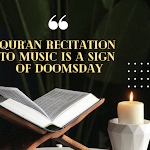\u003cb\u003e petty image\u003c/b\u003e As the top leaders of the two parts of the divided Tabligh Jamaat in Bangladesh could not agree on a single Ijtema, two separate world Ijtemas are going to be held in Tongi near Dhaka next January. After a meeting with leaders of both sides in D…
Read more »Cari Blog Ini
Catatan Yang Ditampilkan
Saudi Arabia's Vision 2030 vs Islamic Values: A Critical Look
🕒 Published on: July 8, 2025 | 📚 Category: Islamic Reforms & Politics Saudi Arabia’s Vision 2030 is reshaping society—but is it ...

Friday, October 14, 2022
Sunday, September 4, 2022
Qur'an recitation to music is a sign of doomsday.(Ababil Islamic News)
The Holy Qur\u0026#39;an is the only true heavenly book in the world. No scholar or linguist has been able to prove the slightest mistake in this Qur\u0026#39;an till date. Rather, the number of thinkers who have found guidance in the Qur\u0026#39;an while searching for…
Read more »Sunday, July 10, 2022
Two ministers resign in Pakistan: Conflict between two brothers to stop Imran!(Ababil islamic news).
Two ministers from the ruling Muslim League-Nawaz (PML-N) have resigned to block Imran Khan\u0026#39;s Tehreek-e-Insaf (PTI) in the upcoming by-elections for 20 seats in the Punjab Assembly. One of them is a federal minister, the other is a provincial minister…
Read more »Monday, May 30, 2022
Atharva government is going to recognize Israel: Imran.(Ababil islamic news)
Imran Khan has alleged that the current coalition government of Pakistan led by Shahbaz Sharif is going to recognize Israel. News of Geo News. The allegations were made by party chairman and former prime minister Imran Khan at a Pakistan Tehreek-e-Insaf (P…
Read more »Friday, May 27, 2022
China is a bigger threat than Russia.Ababbil islamic news.
The United States sees China as a bigger trouble than Russia. According to them, Russia is now in peril. China could be a bigger trouble in the future. US Secretary of State Anthony Blinken was speaking at George Washington University on Thursday. There h…
Read more »Russia has previously surrounded Ukrainian troops.Ababil islamic news
\u003cb\u003e The advancing Russian forces have previously surrounded the Ukrainian army. They occupy an important connecting street with Ukraine-controlled cities. A Ukrainian official said on Thursday.\u003c/b\u003e Russia is trying to consolidate control of the Ukrainian industri…
Read more »Friday, January 21, 2022
The United States and Germany want a speedy nuclear deal with Iran
Western nations believe Iran could develop a nuclear weapon. For this reason, the United States and Germany want a nuclear deal with Iran as soon as possible. US Secretary of State Anthony Blinken is currently visiting Germany. The two leaders said after t…
Read more »










